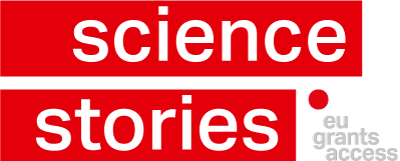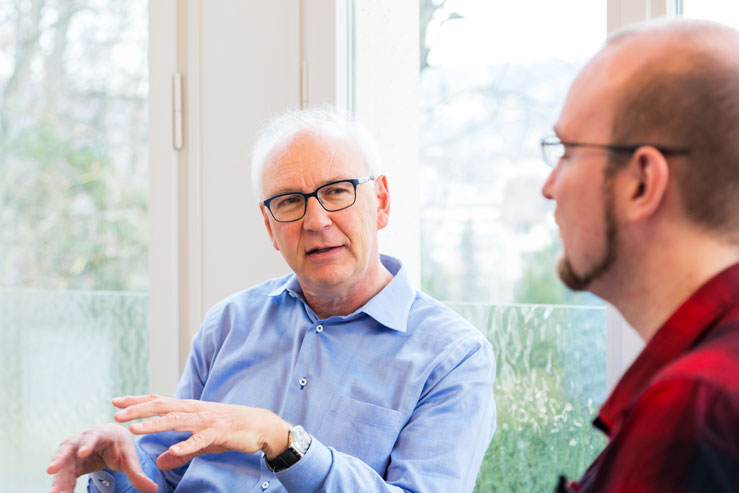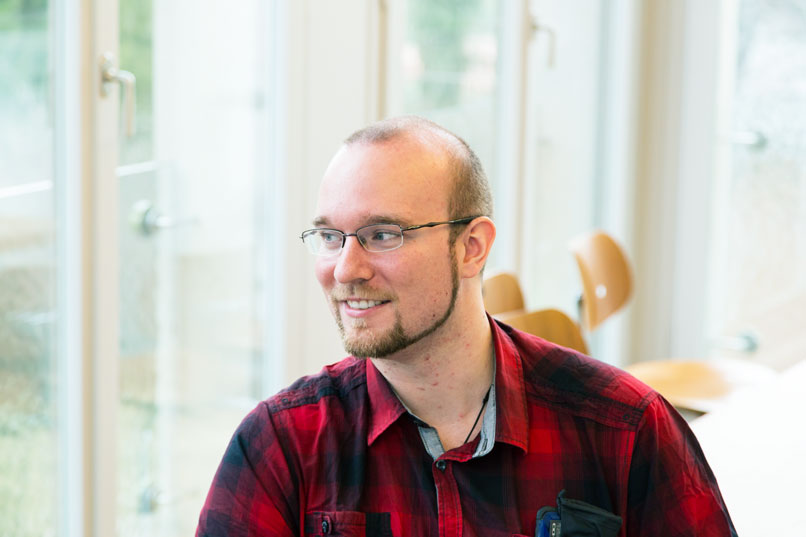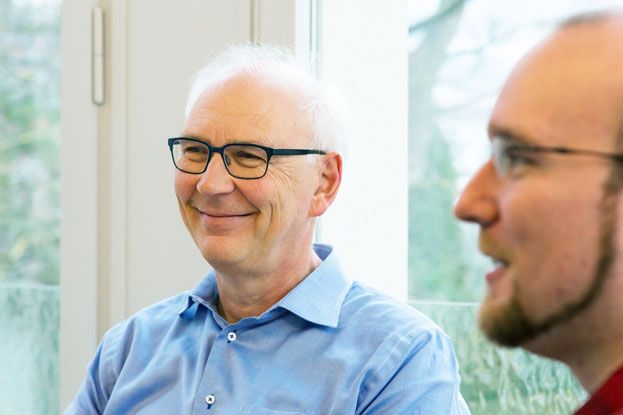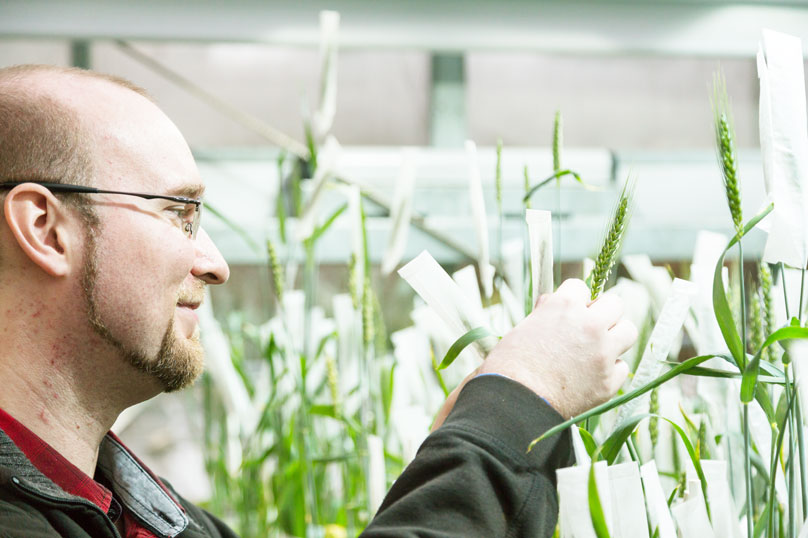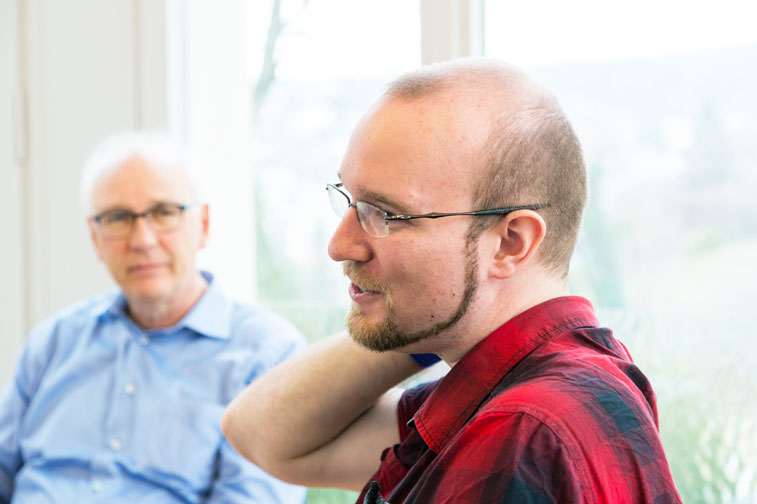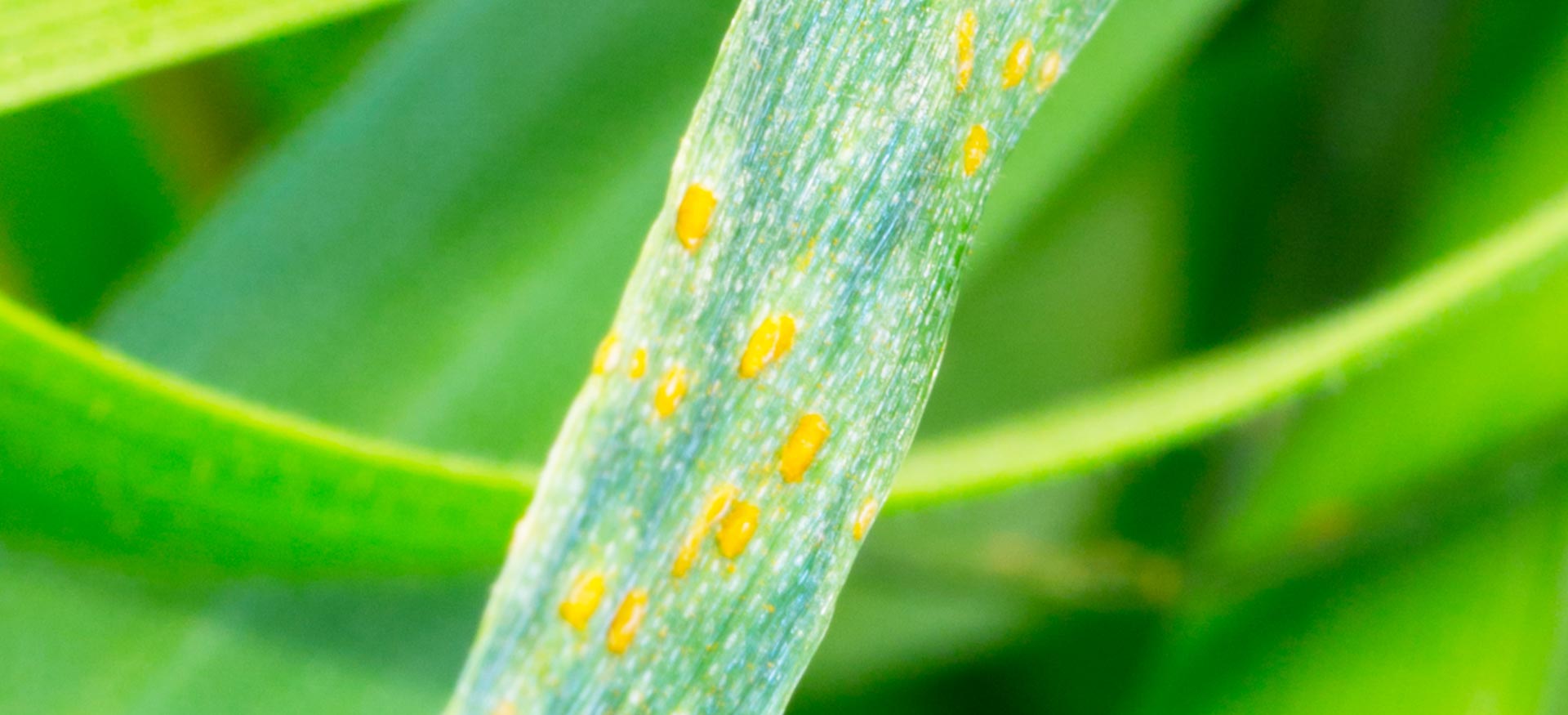
Of men, wheat and fungi
One training programme — two experiences
How a European Training Network equips PhD candidates with the skills needed for their professional future, why plant scientists will never run out of work and why it is crucial for Switzerland to have access to EU research programmes.
An interview with Beat Keller and Markus Kolodziej.
Beat Keller
is Professor for Plant Molecular Biology at the University of Zurich. In one of his research foci he addresses the genetic bases of fungal resistance of wheat. Beat Keller’s research group is one of the ten university and research partners of the international training network called CerealPath, funded by the EU within the scope of its Marie Skłodowska-Curie Training Networks Programme.
Markus Kolodziej
completed his studies at the Ludwig-Maximilians-Universität (LMU Munich) in Germany with a Master’s degree in Biology. In February 2016, he started his doctoral programme with Professor Beat Keller at the Department of Plant and Microbial Biology at the University of Zurich. Markus Kolodziej is one of the 15 PhD candidates of the CerealPath project.
Beat Keller, can you take stock of the CerealPath project at this point?
The most important aspect is, for me, that we were able to train 15 PhD candidates all over Europe who contribute greatly to plant research. It is wonderful to see that young people, who initially knew little about the research topic at hand, have turned into experts and have achieved very much. However, I have also noticed that many of the projects are still not completed. Many of the PhD theses are currently at a stage that absolutely requires continuation and certainly an additional fourth year. But considering that the funding for this project was set to three years, I must say: We have achieved the maximum during this time frame.
There are numerous approaches to control cereal diseases. Which ones did CerealPath deal with?
In Europe today, fungal wheat diseases are mainly fought by chemical fungicides. This is eco-unfriendly and there is strong political pressure within the EU and also within Switzerland to reduce the use of fungicides. We therefore have to find other approaches in crop protection. One alternative is certainly to count on the genetic resistance of plants — in our case this means to cultivate wheat varieties for resistance to fungi and to identify and use genes such as the one Markus characterises in his PhD thesis. Additionally, we also have to look for other, novel possibilities. Another alternative could be endophytes; these are fungi that naturally occur within the wheat plant itself and do not damage the plant but protect it from other harmful fungi. Within the scope of CerealPath, we have explored, discussed and researched this entire range of current approaches.
What was your motivation to launch an EU project together with your colleagues?
I had different reasons. The most trivial one being that we all need money in order to advance our research projects. Research funds, for me, were certainly among the three main motives for participation. The second one was the desire to become part of the network within which one works during such an EU project. The knowledge transfer taking place during meetings, telephone conferences and inside the doctoral committee reunions is extremely inspiring. The third motive was that we all hope to enhance the competence in our field of expertise in Europe and that more young people are trained in the latest research developments. This is also the wish of the European seed cultivation companies. Many of them search desperately for competent plant scientists with experience in plant breeding these days.
How did you select the PhD candidates for the project?
Each of the participating universities announced a PhD position on their website for their specific research project. However, a joint selection committee was convened at the beginning and the appointment of each PhD candidate had to be approved by the committee. With this, we wanted to ensure a consistent quality. I could therefore not just simply hire Markus. I had to send his CV to the committee and wait for their approval. What was more, the PhD candidates could not come from the same country as the university conducting the research work. This is not a given for many universities in Europe. However, the requirement to look for candidates outside one’s own country has brought together a group of very interesting, multifaceted young people.
In hindsight, what would you optimise regarding such EU trainee programmes?
I notice a tendency within the EU to bog the PhD studies down with too much mandatory course work because it is said that the young people also have to acquire these and other skills. Then again, PhD candidates must above all be able to conduct independent, scientific work, which requires a lot of time. During the three years of the project, Markus was absorbed in course work and attending workshops during at least half a year, in addition to the experimental tasks. I am rather critical of this tendency towards an increase in course attendance. A second issue I would optimise is the content of the courses themselves. During these three years, I realised that the young graduates must possess very good knowledge in bioinformatics. I therefore agree with Markus when he proposes to enhance the training in bioinformatics for future programmes.
Was there a special discovery made during this project?
For me, a special discovery were the novel approaches to control harmful fungi biologically by means of endophytes. Fungi already living inside the plant and protecting it against harmful fungi are purposefully promoted. Up to now, this type of crop protection has only worked reliably under laboratory conditions. But maybe one day it will be possible in the fields, too, altough there are still many steps to take on the way to successful application.
Tell us about the importance of having access to such EU projects.
I find it very important. Like many other researchers, I do have certain reservations regarding EU programmes, as they involve much bureaucracy and controls. But my long-term experience with EU projects has shown that the advantages far outweigh the disadvantages. It is not only the additional funds that are made available. It is also about the contacts, the access to knowledge and networks in which one is a part of a greater whole. This is essential for small countries such as Switzerland.
Politicians claim that rich Switzerland could come up with the funds all by itself.
This is true, but it is not enough. Of course this could be a possible emergency solution, delivering the money directly to my lab instead of receiving it from the EU. But I would not be integrated in these networks. I am participating in another EU project which we are about to complete. In this programme, over 20 research groups in Europe examine the same 500 genotypes of wheat. Each group is responsible for a segment. The collaboration generates the added value. If my group receives more money but is not a partner within the network — how should we be able to achieve something this big?
Where do you see the future of crop protection?
There is not a single miracle technology solving all the problems.We are dealing with complex ecosystems. Great potential lies within intelligent cropping strategies as propagated by organic farming. But this is not enough. In certain situations, chemical plant protection will be needed. However, genetic resistance will be of outmost importance in the future, certainly, which means to make plants more resistant to diseases by targeted use of resistance genes. The question is solely whether this sould happen by conventional approaches alone or whether gene technology methods such as genome editing or transgenes may be used. This much is certain: We need a strong reduction of chemical crop protection.
Markus Kolodziej, the CerealPath project will end soon. What have you learned?
I have grown personally during the project because of the exchange with the other 14 PhD candidates and their supervisors. I have gained a lot from this. Thinking back on where I stood after completing the Master’s degree… which had been an excellent education, yet very local, based in Munich. Now I have the skills to go out into the wider world.
What other advantages did you gain from this project?
Above all, a new international network. The fact that I regularly met the colleagues and their supervisors, all of them working on various topics, during courses and meetings and thus making contacts with them – this is the main gain of this project. Now, they all know me and I know them! Another advantage was the traineeship with one of the industrial partners. During five weeks, I worked on the trial fields of the seed producer KWS in Germany, where I learned about different types of wheat and tested them for diseases that broke out during that period. And, finally, of course the research work conducted in Zurich. I have achieved good results during the past two years and am planning to publish them in 2019 in a journal.
You said this project pushed open the door to the world. In what ways?
Now, I have good connections to professors from all over Europe. Once I will have finished my PhD, I will have another close look at their current projects and decide whether I would like to participate in them. Now I know what the people are working on and the topics I find interesting. Maybe another change of subject could be interesting. Maybe it would be interesting to continue research in a similar field. Maybe it would also be interesting to work with one of the industrial partners for a while. Here, I have also made contacts during the CerealPath project. But for now, I focus on completing my PhD and then we will see.
What is the topic of your PhD project?
We analyse the genes in wheat that make the plant more resistant to the harmful fungus called wheat leaf rust. We have to identify these genes in the plant in order to facilitate a targeted use of the genes and to find out how exactly they protect the plant from pests.
What was your motivation to participate in the CerealPath project?
During my Master’s thesis in Munich I had already dealt with plant-fungus interactions, albeit with their symbiotic aspects, that is to say an interaction beneficial to both organisms. I now wanted to get to know the protection mechanisms of plants against harmful fungi as well as move from basic to more applied research. This is why I had applied for the PhD position with Beat Keller. It was certainly an additional motivating factor that this position included the participation in the CerealPath project.
Looking back, what would you improve in terms of this trainee programme?
I would spread many of the mandatory courses more widely over the entire three years. When I came to Zurich as a PhD candidate, I knew next to nothing but had to leave again pretty soon to attend the first courses. When I came back, I had to start anew in many areas. But then, there was already the next course; not to mention the time-consuming preparation and post processing pertaining to such international courses. In the beginning, this was rather difficult — especially when working with plants that need time to grow and that require you to conduct certain experiments with them at specific times. As for the courses’ contents: Many of them covered very interesting topics, such as the bioinformatics workshop in Norwich. Unfortunately, it was merely bioinformatics in a nutshell. I would definitely extend the training in bioinformatics in the future. Then there were courses which, in my view, were rather unnecessary. Especially the trainings one could or should complete at graduate school at the university back home; they are not needed again during the EU project.
Is there a single moment during this programme which you would describe as a true highlight?
It is the team that makes the moments unforgettable. The 15 CerealPath PhD candidates sitting together at a conference dinner having a good time, establishing friendships — this outlasts the project duration and will continue to be a part of both my professional as well as my personal life.
Why did you study crop protection in the first place?
One always talks about the «arms race»between the pathogens and the host over the entire evolution. A fungal pathogen infects a plant as a host, the plant then develops a resistance gene and fights off the fungus. But after some time, the fungus again vanquishes this resistance. It is our goal to discover the various resistance genes contained in wheat plants and to develop them for the cultivation of resistant, high-yielding types. However, we should not rely on resistance for good — just as we could not rely on the fact that the antibiotics in medicine that were discovered during the last century would not one day lose their effect. I have learned from the experiences made with antibiotics in medicine when it comes to plant protection: We should never cease to research. Plant scientists will therefore never run out of work.
Interview with Markus Kolodziej (in German)
CEREALPATH
Wheat is one of the most important crops of humankind. However, a large number of various harmful fungi reduces the annual crop yields by at least 10%, which equals 70 million tons. The CerealPath (Cerealphatology) training programme imparts to young PhD candidates the latest findings and methods with which wheat and barley diseases can be controlled effectively. In parallel to the research for their doctoral thesis, the researchers are also equipped with novel, innovative research approaches and techniques during courses, workshops and internships and gain an insight into the main research of the project partners. CerealPath is a training network of 22 European partners (seven universities, three research institutes and eleven industrial partners and national agricultural authorities, respectively), a joint kind of graduate school. 15 young researchers from Europe, Africa, Asia and Latin America participate in the programme, completing their doctoral studies at one of the collaborating European partner universities. In Switzerland, it is the Department of Plant and Microbial Biology of the University of Zurich as well as the Zurich-Basel Plant Science Center of the Universities of Basel and Zurich and of ETH Zurich. https://cerealpath.eu/
CerealPath was funded with roughly four million euros by the EU within the scope of its Marie Skłodowska-Curie Training Networks Programme. The project duration is set to four years and will end officially on 31 August 2019. https://cordis.europa.eu/project/rcn/198261/factsheet/en
